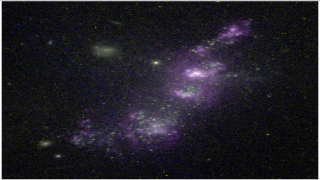Bibcode
Huertas-Company, M.; Aguerri, J. A. L.; Tresse, L.; Bolzonella, M.; Koekemoer, A. M.; Maier, C.
Referencia bibliográfica
Astronomy and Astrophysics, Volume 515, id.A3
Fecha de publicación:
6
2010
Revista
Número de citas
41
Número de citas referidas
41
Descripción
Context. Studying outliers from the bimodal distribution of galaxies in
the color-mass space, such as morphological early-type galaxies residing
in the blue cloud (blue E/S0s), can help for better understanding the
physical mechanisms that lead galaxy migrations in this space.
Aims: In this paper we try to bring new clues to studying the evolution
of the properties of a significant sample of blue E/S0 galaxies in the
COSMOS field. Methods: We define blue E/S0 galaxies as objects
having a clear early-type morphology on the HST/ACS images (according to
our automated classification scheme galSVM) but with a blue rest-frame
color (defined by using the SED best-fit template on the COSMOS primary
photometric catalogs). Combining these two measurements with
spectroscopic redshifts from the zCOSMOS 10k release, we isolated 210
IAB < 22 blue early-type galaxies with M_*/M_&sun; >
1010 in three redshift bins (0.2 < z < 0.55, 0.55 <
z < 0.8, 0.8 < z < 1.4) and studied the evolution of their
properties (number density, SFR, morphology, size). Results: The
threshold mass (Mt), defined at z = 0 in previous studies as
the mass below which the population of blue early-type galaxies starts
to be abundant relative to passive E/S0s, evolves from log (M_*/M_&sun;)
~ 10.1 ± 0.35 at z ~ 0.3 to log (M_*/M_&sun;) ~ 10.9 ±
0.35 at z ~ 1. Interestingly, it follows the evolution of the crossover
mass between the early and late type populations (bimodality mass)
indicating that the abundance of blue E/S0 is another measure of the
downsizing effect in the build-up of the red sequence. There seems to be
a turn-over mass in the nature of blue E/S0 galaxies. Above log
(M_*/M_&sun;) ~ 10.8 blue E/S0 resemble to merger remnants probably
migrating to the red sequence on a time scale of ˜3 Gyr. Below
this mass, they seem to be closer to normal late-type galaxies, as if
they were the result of minor mergers that triggered the central star
formation and built a central bulge component or were (re)building a
disk from the surrounding gas in a much longer time scale, suggesting
that they are moving back or staying in the blue cloud. This turn-over
mass does not seem to evolve significantly from z ~ 1 in contrast to the
threshold mass and therefore does not seem to be linked with the
relative abundance of blue E/S0s.
Proyectos relacionados

Grupo de Estudios de Formación Estelar GEFE
El proyecto interno GEFE está enmarcado en el proyecto coordinado, ESTALLIDOS, financiado por el plan nacional desde el año 2001. El ultimo proyecto aprobado es ESTALLIDOS 6.0 (AYA2016- 79724-C4-2-P). En el proyecto GEFE trabajamos en base al caso científico del proyecto ESTALLIDOS 6.0. Los estallidos de formación estelar (Starbursts o SB) son
Casiana
Muñoz Tuñón